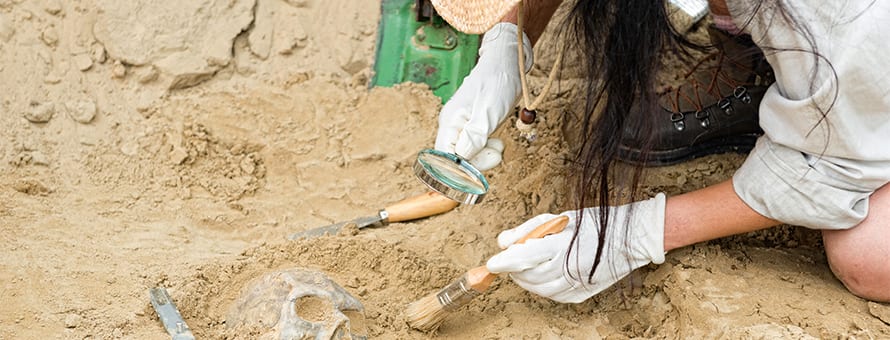What Can You Do With an Anthropology Degree?

Know before you read
At SNHU, we want to make sure you have the information you need to make decisions about your education and your future—no matter where you choose to go to school. That's why our informational articles may reference careers for which we do not offer academic programs, along with salary data for those careers. Cited projections do not guarantee actual salary or job growth.
A career in anthropology may spur images of buried bones and the adventures of “Indiana Jones,” but the field is broad — and not limited to excavation sites and lost temples. While archaeology often garners the most attention in popular culture, it's just one of many directions you can take.
If you love learning and are curious about the people and world around you, you might consider a degree in anthropology. This degree can help you explore roles in both the public and private sectors, working in business, technology, advocacy and more.
So, What is Anthropology?

"(Anthropology) is the study of humans and their non-human primate ancestors through space and time,” said Dr. Elizabeth Johnson, an associate dean of functional and academic effectiveness at Southern New Hampshire University (SNHU) and an anthropology adjunct with a PhD in the field.
Anthropology is a field that takes a holistic view of the human condition and can be used to understand people and cultures of the past and present, recognizing shared values and patterns. The principles of anthropology can offer you a unique lens and insight into human behavior — a skill transferable across industries and job roles.
“The study of anthropology can be important for anyone, even if they’re not planning on becoming an anthropologist,” said Heather York, an adjunct faculty member at SNHU and forensic archaeologist. “At its heart, anthropology shows us the ways in which we're all the same, even though it does that while exploring ways in which we're different.”
Because of the education involved in anthropological studies, Dr. Ian Edwards, an adjunct faculty member at SNHU and cultural and environmental anthropologist, said anthropology is more of a lifestyle than a discipline.
“It’s really about understanding differences between cultures, and through those sort of observations, we can see there’s fundamental common ground shared between all cultures,” he said. Looking at the differences and similarities between cultures can help people better understand themselves and others, according to Edwards. This can also aid in bias detection.
What Are 4 Types of Anthropology?
Anthropology is divided into four main focuses — archaeology, biological, cultural and linguistic. Johnson and Edwards describe these subfields:
- Archaeology: Archaeology is all about uncovering and preserving remains and artifacts to study and understand people and cultures of the past.
- Biological: Biological anthropology, also known as physical anthropology, works to understand the evolutionary history of humankind. You can also use it to inform present-day subjects such as forensics and diseases.
- Cultural: Also known as sociocultural anthropology, cultural anthropology considers the lives and dynamics of contemporary societies, and you can study your own culture and others around the world.
- Linguistic: Linguistic anthropology is the study of language and how it came to be and evolved. Even the same language can vary based on culture or location; for example, some U.S. states say “soda” to describe a carbonated drink, while others call it “pop.”
Although these are the four widely accepted types of anthropology, they do not operate in silos. Instead, they often bleed into one another, with culture being at the heart of everything anthropologists do, according to Johnson, who has conducted fieldwork for firms and agencies such as the National Park Service.

A fifth type — applied anthropology — is establishing itself, too, Edwards said. Applied anthropology focuses on finding solutions to real-world problems relating to humankind.
To truly understand anything that involves people, Edwards “would highly recommend an anthropological perspective, which is looking at it through each of those different subfields,” he said. “Each of those provides key insights and allows a better understanding of whatever you’re looking at.”
Within each subfield, there are additional subsets. Take archaeology, for example. You might decide to narrow your studies further, focusing on prehistoric archaeology.
What Kind of Jobs Can You Get With an Anthropology Degree?
Since anthropology is a people-oriented degree that establishes foundations in a range of subjects and requires transferable skills, endless career options and educational pathways are available.
There is a growing demand for anthropologists, too.* The field is projected to expand 8% by 2033, according to the U.S. Bureau of Labor Statistics (BLS), and anthropologists and archaeologists earned a median of $63,800 in 2023.*
Although additional education and experience are typically required to hold the title of anthropologist, beginning with a bachelor's degree in anthropology can offer you the foundations for roles such as:
- Environmental specialist: If you’re interested in environmental science, you may consider a career in the National Park Service or the State Department’s Office of Environmental Quality. Edwards sometimes sees anthropologist majors with a focus on the environment go on to work with U.S. Fish and Wildlife Service — as well as national and international non-governmental organizations.
- Field technician: With a bachelor’s degree, you might start in archaeology as a field technician. As a field technician, you could survey land for archaeological resources whenever there are plans for ground disruption — such as installing a highway or oil pipeline, Johnson said. There are also specializations compliance and contracts, for example.
- Medical anthropologist: This is a form of applied anthropology that requires advanced education and training not offered at SNHU. The career merges fundamental principles of anthropology and an understanding of health issues and the medical industry. “It's a great connection and allows you to do really influential work within that realm,” Edwards said. Medical anthropologists can help develop important policies and processes for providing health care to diverse populations, for example.
- Museum curator: If you’re interested in archaeology, you may consider the role of a museum curator. Curators acquire, store and create exhibits for artifacts, often focusing on a niche such as artwork or natural history, BLS said. Curators made a median salary of $61,750 in 2023, and the projected job growth is 12% by 2033.*
- Professor: If training the next generation of anthropologists interests you, academia is another popular career path. You’ll likely need an advanced degree and some experience within an anthropology career. Anthropology and archaeology teachers at the postsecondary level earned a median salary of $93,650 in 2023, BLS reported.* Some colleges and universities offer standalone anthropology programs, while others group the courses within history or geography departments, Johnson said. Often, linguistics coincides with English degrees.
But an anthropology degree can also prepare you for numerous careers beyond what you might expect. Johnson said very few people who get a degree in anthropology have anthropology in their job title.
The skills learned at a bachelor’s degree level allow you to bring a unique perspective to a team.
“Having a background in anthropology could be beneficial for almost any job,” York said. “Anyone who works with clients, patients or customers needs to use ‘cultural relativism’ in order to avoid ethnocentric attitudes and behaviors.”
You could also put your degree to work in roles relating to:
- Advertising: Advertisers seek to understand their target audience and explore how they can reach new people. Understanding consumer behavior and the ability to conduct and analyze market research is helpful when planning marketing campaigns. Advertising, promotions and marketing managers earned a median of $156,580 in 2023, and the job is projected to grow 6% by 2032, BLS reported.*
- Diversity: Companies with the most diverse executive teams in terms of gender and ethnicity are on average 9% more likely to outperform their less diverse peers in 2023, according to McKinsey and Company. With an anthropology background, you could bring skills in cultural relativism to a diversity office, allowing you to see and understand multiple perspectives.
- Human resources: In addition to needing effective communication and problem-solving skills, organizations can operate better when human resources employ cultural relativism. “You’re dealing with such diverse groups of people,” Edwards said. “You need to be able to understand things from other people’s perspectives.” The demand for human resources specialists is projected to grow 8% by 2033, according to BLS, and last year those in the role made a median of $67,650.*
- Social justice: As an advocate or another type of social justice professional, you might work in nonprofits or the court of law, engaging in social issues that incite your passion. Edwards said some anthropologists who pursue an advocacy career might continue their education to obtain a law degree, which is not currently offered at SNHU.
- User experience and research design: You can use your knowledge of human behavior and different cultures to examine how people use a product, service, store, website or branding and explore ways to optimize the experience. Job descriptions often call for: “sociology, anthropology, psychology, people with knowledge of, essentially, human behavior,” Johnson said. “They want to know how humans do things.”
“The study of anthropology can be important for anyone, even if they’re not planning on becoming an anthropologist,” York said.
Find Your Program
Where Do Most Anthropologists Work?
Anthropologists work in all types of environments — from office settings to outdoor sites, locally and globally. It all depends on your field and role.
Edwards paired his interest in ecology with cultural anthropology to devote his career to wildlife conservation. “Understanding why and how people use their wildlife the way they do is my passion,” he said.
Before focusing his career on academics, Edwards spent years in West Africa — beginning with the Peace Corps — studying how people use their wildlife. He uses ethnographic evidence to help inform the development of “culturally sensitive and ethically grounded conservation policies,” he said.
York’s work as a forensic archaeologist took her around the world, too: from studying human remains from the Spiro Mounds site in Oklahoma to working in Bosnia-Herzegovina for two years, assisting in the recovery and identification of victims of the Bosnian War.
[Note: While a bachelor's degree in anthropology is foundational, both Edwards and York have advanced education in the field.]
Is an Anthropology Degree a Good Degree?
Pursuing a bachelor’s degree in anthropology can prepare you for advanced education or a career in numerous industries and roles because programs are formatted to help you develop skills in:
- Analysis and critical thinking
- Collaboration
- Cultural relativism
- Ethics
- Verbal and written communication

“(Cultural relativism) means we do our best to avoid judgments of other people’s ways of doing things, taking into account the culture that gave rise to those behaviors and beliefs,” York said.
What York believes to be one of the best parts of an anthropology program is the curiosity it nurtures. “The study of anthropology allows us to see the entire world from a broader perspective,” she said. “It gets us out of the narrow cultural frame of mind that most of us are born with, and that broader perspective (hopefully) stays with you forever.”
You can also learn how to avoid judgments and consider a culture’s role in behavior and ways of life, which is an important skill for any job in which you might work with others.
“While it’s impossible to be completely objective and unbiased in many situations, learning to be aware of our ethnocentric tendencies helps us to see things better from the perspective of others,” York said. “What employer who deals with a broad spectrum of humanity wouldn’t want to hire someone with that kind of awareness?”
If you're passionate about helping others, an anthropology degree can also provide you with the tools to do so.
Julie Matthews '23 said she earned her bachelor's degree in anthropology due to her love of learning about people, her appreciation of culture and her interest in human history. With her degree, she said she hopes to pursue a master's degree and work in international humanitarian aid.
"One day, I hope to use this degree and work to make this world a safer place for others who are in need," she said.
In 2019, Matthews was diagnosed with a rare type of sarcoma called extraskeletal myxoid chondrosarcoma. Despite the physical and emotional challenges she faced, she said that her academic journey brought her hope and purpose.
Finding Your Interests
If you’re interested in many subjects, majoring in anthropology may be a good solution. York had trouble choosing a college major; there was so much she wanted to study — writing, political science, history, gender roles, economics and religion. When she learned about anthropology, she realized she could combine all her interests. “I found a major that allowed me to study all of those and more,” she said.
An anthropology background pairs well with many interests and passions, whether it’s examining water shortages, ethnomusicology, transgender healthcare, climate change, economic pressures of immigration and so on, Edwards said.
When you’re considering anthropology programs, look for the possibility to explore different areas of interest. For example, at SNHU, students complete a capstone project on a topic of their choosing. Edwards, who often facilitates these courses, said students have the freedom to explore their passions and how they relate to anthropology.
What you focus your capstone on can help you advance in anthropology. “They’re going to contribute to the discipline and contribute to making their world a better place,” Edwards said. He said they also often serve as a stepping stone into a master’s in applied anthropology program. (Graduate degrees in applied anthropology are not currently offered at SNHU.)
Having an opportunity to explore your interests in this broad field can help you identify your passion, gain pertinent knowledge and experience and search for a career that excites you.
Consider an Advanced Degree
A bachelor’s degree in anthropology opens many doors to potential career paths, equipping you with broad skills and teaching you how to interact with and understand people. “You’re a generalist,” Edwards said. “You have a good understanding of the human condition.”
But if you want to advance to a career with "anthropologist" in the job title, you’ll likely need at least a master’s degree. (Graduate degrees in anthropology are not currently offered at SNHU.)
Pursuing a master’s degree — or even a PhD — is recommended if you want to become a professional anthropologist, and an undergraduate anthropology degree should prepare you for that, Johnson said. The advanced degrees not only give you the necessary credentials, but they also allow you to get more specific in your studies, honing in on the subject that interests you.
Getting volunteer experience in a field, position or organization you’d like to enter can also help you stand out. “Volunteer experience can be critical in a field that prizes hands-on experience, and it’s a great way to meet professionals,” York said. “Once you have the academic knowledge and skills to be useful as a volunteer, start looking for opportunities at a local university, museum or even your state archaeologist’s office.”
Volunteer work can help you expand your network and determine what direction you might want to take a people-focused career.
Discover more about SNHU's online anthropology degree: Find out what courses you'll take, skills you’ll learn and how to request information about the program.
*Cited job growth projections may not reflect local and/or short-term economic or job conditions and do not guarantee actual job growth. Actual salaries and/or earning potential may be the result of a combination of factors including, but not limited to: years of experience, industry of employment, geographic location, and worker skill.
Rebecca LeBoeuf Blanchette '18 '22G is a writer at Southern New Hampshire University, where she fulfills her love of learning daily through conversations with professionals across a range of fields. She earned her Bachelor of Arts in Communication with a minor in Professional Writing from SNHU’s campus in Manchester, New Hampshire, and followed her love of storytelling into the online Master of Arts in English and Creative Writing at SNHU. Connect with her on LinkedIn.
Explore more content like this article

How Psychology Grad Amanda Saldana Found Community as an Online Student

Academic Spotlight: Dr. Laman Tasch, Associate Dean of Academic Strategy, Social Sciences

Why Earning His BA in Political Science Mattered to Anthony Fernandez
About Southern New Hampshire University

SNHU is a nonprofit, accredited university with a mission to make high-quality education more accessible and affordable for everyone.
Founded in 1932, and online since 1995, we’ve helped countless students reach their goals with flexible, career-focused programs. Our 300-acre campus in Manchester, NH is home to over 3,000 students, and we serve over 135,000 students online. Visit our about SNHU page to learn more about our mission, accreditations, leadership team, national recognitions and awards.


